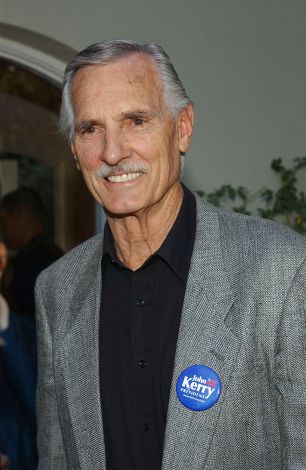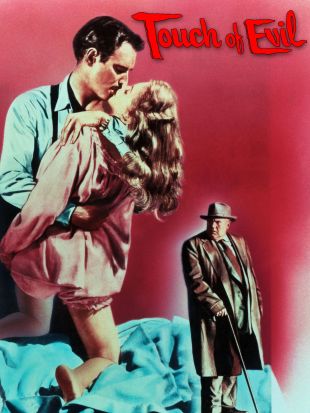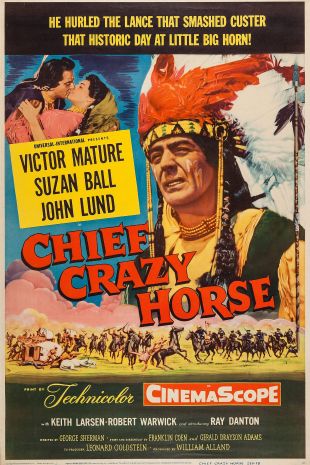A track star at the University of Oklahoma, Dennis Weaver went on to serve as a Navy Pilot during World War II. After failing to make the 1948 U.S. decathalon Olympic team, Weaver accepted the invitation of his college chum Lonny Chapman to give the New York theatre world a try. He understudied Chapman as "Turk Fisher" in the Broadway production Come Back Little Sheba, eventually taking over the role in the national company. Deciding that acting was to his liking, Weaver enrolled at the Actors' Studio, supporting his family by selling vacuum cleaners, tricycles and ladies' hosiery. On the recommendation of his Actors' Studio classmate Shelley Winters, Weaver was signed to a contract at Universal studios in 1952, where he made his film debut in The Redhead From Wyoming (1952). Though his acting work increased steadily over the next three years, he still had to take odd jobs to make ends meet. He was making a delivery for the florist's job where he worked when he was informed that he'd won the role of deputy Chester Goode on the TV adult western Gunsmoke. So as not to be continually upstaged by his co-star James Arness (who, at 6'7", was five inches taller than the gangly Weaver), he adopted a limp for his character--a limp which, along with Chester's reedy signature line "Mis-ter Diillon" and the deputy's infamously bad coffee, brought Weaver fame, adulation and a 1959 Emmy Award. Though proud of his work on Gunsmoke--"I don't think any less seriously of Chester than I did about King Lear in college"--Weaver began feeling trapped by Chester sometime around the series' fifth season. Having already proven his versatility in his film work (notably his portrayal of the neurotic motel night clerk in Orson Welles' Touch of Evil [1958]), Weaver saw to it that the Gunsmoke producers permitted him to accept as many "outside" TV assignments as his schedule would allow. Twice during his run as Chester, Weaver quit the series to pursue other projects. He left Gunsmoke permanently in 1964, whereupon he was starred in the one-season "dramedy" series Kentucky Jones (1965). In 1967, he headlined a somewhat more successful weekly, Gentle Ben (1967-69) in which he and everyone else in the cast played second fiddle to a trained bear (commenting upon his relationship with his "co-star", Weaver replied "I liked him, but it was a cold relationship...Ben didn't know me from a bag of doughnuts.") The most successful of Weaver's post-Gunsmoke TV series was McCloud, in which, from 1970 to 1977, he played deputy marshal Sam McCloud, a New Mexico lawman transplanted to the Big Apple. In addition to his series work, Weaver has starred in several made-for-TV movies over the past 25 years, the most famous of which was the Steven Spielberg-directed nailbiter Duel (1971). Dennis Weaver is the father of actor Robby Weaver, who co-starred with his dad on the 1980 TV series Stone.

Dennis Weaver
Share on
Biography by AllMovie
Movie Highlights
Factsheet
- Served during World War II as a Navy pilot.
- In 1948, placed sixth in the decathlon at the national tryouts for the Olympics.
- First Broadway role was in Come Back, Little Sheba.
- Found TV fame as good-natured, limping deputy Chester Goode on Gunsmoke in a role that earned him an Emmy in 1959.
- Moved from second-in-command to lead law-enforcer as the title character in the 1970s drama McCloud, in which his character (a New Mexico lawman battling Manhattan criminals) was known for his down-home attitude, summed up in his famous catchphrase, "There ye go."
- President of the Screen Actors Guild from 1973 to 1975.
- Released several country-music albums.
- Received the 1986 Presidential End Hunger Award for cofounding L.I.F.E. (Love Is Feeding Everyone), an organization that provided food to the hungry in L.A.
- Has a star on the Hollywood Walk of Fame.
- Was an environmentalist who lived in a solar-powered Colorado home; in 1993, founded the Institute of Ecolonomics, dedicated to the mixing of ecology and economy.

/_derived_jpg_q90_310x470_m0/Duel1971-PosterArt.jpg)
